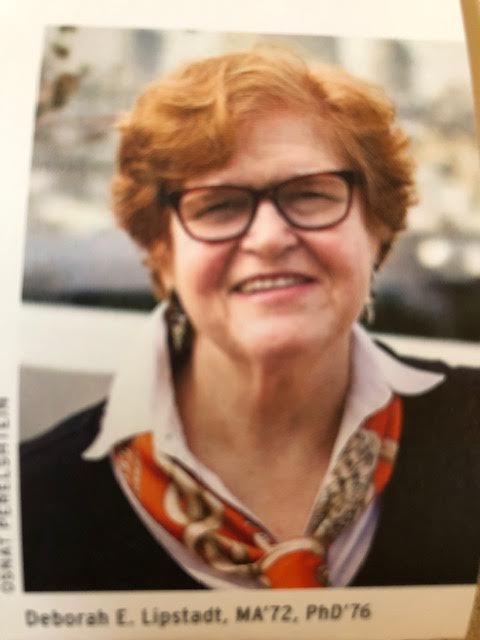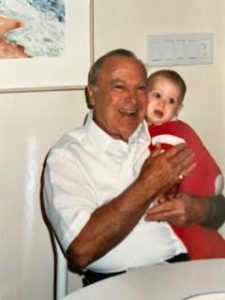
Deborah Lipstadt
My beloved Rabbi Al Axelrad, who was the chaplain at Brandeis when I was an undergrad, retired many years later, but continued to lead High Holiday services until a few years ago. He was a true teacher. His services lasted a long time because he quoted from all sorts of outside texts and I always felt I came away having learned something new.
The last time I saw my father, who died on January 3, 1990, he came into Boston to see his little grandsons and spend Yom Kippur with us. I got him tickets to Rabbi Al’s service and took him over to Brandeis to show him where they were held and where he should park. He came back after the service, truly moved, saying he understood how Al had influenced both his children (my brother became a rabbi in part because of Al’s influence). Dad made a contribution to Hillel at Brandeis in Al’s honor that year. He would only live three more months, but we didn’t know that at the time.
I was decimated by my father’s death (he died of a heart attack, alone in a hospital in Laguna Beach, CA, almost 34 years ago. I still tear up, thinking of him). At services the next autumn, Rabbi Al quoted from an essay from one of his former students: Deborah Lipstadt. She had done her Masters and PhD at Brandeis, overlapped some years with me and been friendly with Al (everyone was). Her essay was called, “The Lord Was His”, and was printed in a collection called “Jewish Reflections on Death”. Al’s quote stuck me, and I spoke to him after the service, asking where it came from. I bought the book and read the essay many times.
Fast forward: Deborah is now a professor at Emory University, a leading authority on antisemitism and the Holocaust. English author David Irving sued her for libel after she called him a Holocaust denier, but she won. The UK libel laws are much more difficult than in the US, so this was a great victory, which she wrote about in “History on Trial”. The case was turned into a movie called “Denial” with Rachel Weisz portraying her.
She was the historical consultant for the establishment of the US Holocaust Museum and, in 2022 was named by President Biden as the US Special Envoy for Monitoring and Combating Antisemitism.
In 2019, Brandeis awarded her an honorary degree and she was the Commencement speaker. My husband and I were at the Fellows Breakfast with all the honorary degree recipients for that day. Our nephew graduated that year and my husband wanted to hurry out and get our seats so we had a good view. I told him I wanted to speak to her and tell her how much her essay had helped me to grieve for my father. I got an eye-roll, but I persisted.
I shyly introduced myself as the sister of Rabbi Richard Sarason (she had heard of my distinguished brother) and long-time friend of Rabbi Al Axelrad. I informed her of that long-ago service where Al had quoted a paragraph from her essay, which made me seek out the entire writing and how much it had helped me, as I read it year after year, trying to seek meaning and solace from my own father’s death.
Her father had left a message to his offspring, which was the point of the essay. A proper German Jewish man who sold monuments, so was involved with death, her father left instructions that the traditional hymn, Adon Olam, be sung at the end of his funeral. That song is only sung at the close of the morning Sabbath service, never at a funeral. She had puzzled about this, then finally focused on the final phrase, which is: “The Lord is with me/I will not fear.” Her father had meant that as his legacy and final message to his children and she understood. We could be sad, lonely, mourn for our loved one, but we were not to fear.
She looked at me with great tenderness. This distinguished scholar and fearless fighter for human rights told me that this essay was the first piece she’d ever had published. It meant so much to her that I took the time to tell her how much the essay meant to me.
Our brief encounter meant the world to each of us.
Retired from software sales long ago, two grown children. Theater major in college. Singer still, arts lover, involved in art museums locally (Greater Boston area). Originally from Detroit area.




Thanx Betsy for this moving story.
I’m reminded that years ago at the funeral of our friend Simon the rabbi also sang Adon Olam. Simon’s wife had requested it as it was a beloved melody of their family – mine too!
One does what is meaningful for the family or the deceased to bring comfort.
You are great at making connections, Betsy. So glad her writing brought you comfort at a difficult time.
Thank you, Laurie. I am glad I followed my instinct and spoke to her. I had no idea it would be meaningful for her too.
This was a moving story, well told. I’m sure it did mean a lot to her to know what a difference she had made in your life, and of course it meant a lot to you to meet such an accomplished and insightful person whose words had comforted you years before. Grief is so powerful, and learning from it can be healing. Condolences on the loss of your father, and I am so glad you connected with Deborah Lipstadt.
I appreciate your condolences, Khati, even more than three decades after my father’s death. It seems that Deborah and I both gained something from our brief encounter. You never know, do you?